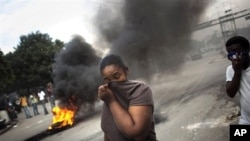Haitian protesters have clashed with United Nations troops, blamed for helping to spread cholera in the Caribbean nation. At least two people died in the clashes, which are raising tensions about the epidemic.
Protests took place in several Haitian cities, including the northern city of Cap-Haitien and Hinche, in Haiti's central valley. Some protesters set up barricades and opened fire on United Nations troops, who fired back in Cap-Haitien.
Officials with the U.N. mission in Haiti said the protests were organized by political agitators, in an effort to disrupt the county before presidential elections set for November 28. In a statement, U.N. officials said peacekeepers are continuing to work with Haiti's government to maintain order and ensure the safety of the elections.
Protesters say they are angry at U.N. peacekeepers from Nepal, who are believed to have brought the cholera bacteria into Haiti. The suspicions center on a Nepalese camp near the Artibonite river in central Haiti, where the cholera epidemic was first detected.
Health experts at the U.S. Centers for Disease Control say initial tests show the cholera strain in Haiti closely matches one found in South Asia. They say additional testing is needed to understand where the bacteria came from and how it arrived in Haiti.
U.N. officials have denied that latrines used by the Nepalese troops were the source of the cholera infection.
Meanwhile, hospitals and clinics are struggling to treat the growing number of people suffering from diarrhea and dehydration, which may be signs of cholera infection.
The France-based group Doctors without Borders says they have treated more than 16,000 people with cholera-like symptoms at 21 clinics it operates around the country.
At one of the group's clinics in Port-au-Prince, Dr. Francois Servranckx says the pace of new patients has eased but only slightly. "It's no longer doubling every day, like it was. But it is still a significant increase. We are talking about more than 1,000 patients being treated in a week," he said.
Health officials say the water-borne disease has now spread to most of Haiti's regions. Servranckx says health workers fear the epidemic will get much worse in coming weeks. "It started in the Artibonite, it spread to the northern side of the country now. It came to Port-au-Prince. In Port-au-Prince we have an increasing number of people coming in to our facilities, but it is probably just the beginning," he said.
Haitian officials say more than 1,000 people have been killed by cholera since it was first detected last month.
Health experts say poor sanitation and lack of clean water supplies have fueled the epidemic. Hundreds of thousands of Haitians continue to live in tent camps with limited access to water supplies, following the January earthquake that destroyed parts of the capital and other nearby cities.
Haitian Protesters Blame UN Peacekeepers for Cholera











